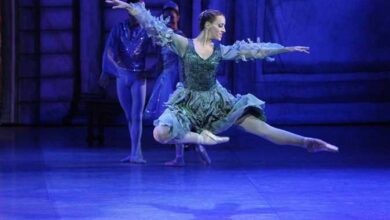Contrary to what’s been reported in several newspapers on Wednesday 16 February, the sit-ins at the Cairo Opera House continue for the fifth day in a row.
Starting last Sunday, around 700 members of the Cairo Ballet Company, Arab Music Ensemble, Cairo Opera Orchestra, Symphony Orchestra, A Capella Choir and Cairo Opera House Choir have been organizing daily sit-ins from noon until 5 PM, demanding the resignation of Dr. Abdel Moneim Kamel, chairman of the National Cultural Center, and his administrative crew. In addition to accusations that Kamel promoted unfair work conditions, the protesters say he illicited enrichment, misappropriated Opera House funds and verbally and physically abused the artists.
“For years, we have been trying to voice our concerns through meetings and negotiations with the opera’s management,” said Khaled Abdel Ghafar, a lead singer at the National Ensemble of Arab Music. Most of the artists and troupe members complain of unfair working conditions. The vast majority operate on renewable annual work contracts, which deprive them of benefits including health care and pensions, as well the annual 10 percent raise in salaries in the government sector. The salaries are very low, ranging between LE 300 and LE 1200.
On 23 July, 2010, when the National Ensemble for Arab Music was performing in a concert attended by President Hosni Mubarak, Abdel Ghafar explained to Mubarak the unfair working conditions from which they suffered and the president promised to follow up on the demands, but nothing changed. Former Minister of Culture Farouk Hosni was also approached several times but did not respond.
“These are chronic problems from which we’ve been suffering for almost two decades. The Opera House’s management had made numerous promises of reform over the years, which they have never kept,” explained Amgad al-Atafy, also a lead singer at the National Ensemble of Arab Music.
In October 2010, one day before the inauguration of Aida Opera at the Giza Pyramids, 120 members of the Opera House Choir and A Capella Choir refused to attend the final rehearsal as they were informed that they would be paid LE60 for each of the six concerts, or a total of LE360, whereas they were paid LE2000 a decade earlier. “The opera’s management used the carrot and the stick tactics, at times threatening to fire us and at others promising to raise our fee. We were finally paid LE800,” said one of the choir members, who preferred to remain anonymous.
Over the years, the Opera has been expanding its administrative staff, the majority of which operates on fixed contracts with benefits and higher pay. Artists, on the other hand, have no social safety network. Dr. Sahar Helmy Helaly, a lead dancer and founding member of the Cairo Ballet and assistant professor at the Arts Academy said that when ballet dancers are severely injured during rehearsals and performances, they are fired and have to pay for their own medication.
Erminia Kamel, the artistic director of the Cairo Ballet Company and wife of Dr. Kamel, is accused of favoring foreign dancers, who lack competency and professionalism. “It would be great if they bring in foreign experts, who would teach us new tactics and add value in terms of the artistic directing of the shows. Yet in most cases the Egyptian dancers, singers and musicians are more talented and experienced than their foreign counterpart,” explained Kamal Rabee, a ballet dancer and choreographer, who has been a member of the Cairo Ballet Company for 12 years.
In 2002, Rabee was awarded the State Prize for Artistic Creativity, which allowed him to attend an 18-month training program in Italy. National Security officers objected to his travel and he has been stigmatized ever since and marginalized from various performances. Rabee has, nevertheless, continued to attend rehearsals and directed a number of small performances, which he personally funded and showed at the Opera House's smaller theater.
Helaly explained that the same shows are being repeated over the years, for which the Opera’s management, including Kamel, receives large fees. Professional development is minimal. “It takes over nine years of continuous training to become a ballet dancer, yet there’s little investment in the development of the 40 Egyptian members of the Ballet Company,” said Helaly.
The artistic directorship is quite rigid and dancers are humiliated when they object or make propositions to the performances. “We need new blood. Where is the younger generation of directors? Where are Dr. Kamel’s students? Why doesn’t he give a chance to new faces and experiences?” asked Helaly. Members of the Orchestra Choir, who previously objected to any administrative or artistic decisions, were scolded and beaten up, in some cases slapped on the face, explained a female choir member. “This cannot continue. We have put up with too much for too long. We were afraid, I have to admit, but now we will stand up for our rights,” she told Al-Masry Al-Youm.
Members of the A Capella Choir accuse the Opera House management of appropriating the revenue of the Andrea Bocelli concert held in Cairo last September. The tickets were supposed to be stamped by the Ministry of Finance before going to the sponsor. “This did not happen and as far as we know, much of the concert’s revenue was distributed among Dr. Kamel and his administrative assistants,” reported a choir member, who also preferred to remain anonymous. Choir members were paid between LE100 and LE300 for that concert.
Over the past two days, the Opera’s management has been trying to meet with each group in privacy, promising better working conditions. “Our demands are not purely socio-economic at this point. We want real change and reforms that cannot be brought about by this system, which long ago lost its credibility. We are willing to negotiate the reforms with a new management, but not with this one,” said Rabee.




